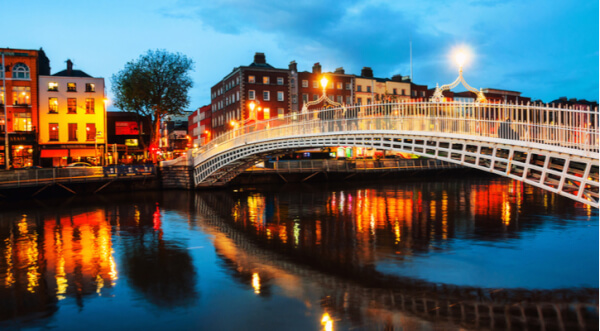Moving to Ireland from Australia
Looking to move to Ireland from Australia? We'll fill you in on the travel and visa requirements, healthcare, cost of living, pros, cons and much more.

Roaming around Ireland is the fantasy of many, driving through the beautiful green countryside and stopping for a pint in any of the country’s quaint small towns or urban metropolises. Despite the country’s small size, life in Ireland requires you to have a vehicle to get around outside of your direct local area; though whether that vehicle is a car, van, motorcycle or scooter is entirely up to you.
In order to prepare yourself for the car buying process, this guide will walk you through everything you need to know about where to find a car, how to buy one, how to register your new car, and some of the special driving laws that are in place in Ireland.
Shipping a car is very straightforward, especially coming from the United States. All you’ll need in order to qualify your car for shipment is a passport, bill of sale and original title.
Around Europe, especially in the Eurozone, shipping is also a breeze. No matter where you’re sending the car from, you shouldn’t pay more than €4000 at an absolute maximum. While the process is relatively easy to set up, long term visitors and residents will have to weigh the expense and familiarity against buying a local vehicle that drives on the left side of the road, in traditional UK manner.
Costs will vary significantly depending on what kind of car you’re looking to buy - used or new, make and model, etc. To give you an idea of the average, a new Toyota Corolla is priced at around €24,000.
You’ll also need to budget for petrol, which will set you back around 1.31€ / liter. Another major factor is car insurance. Although the price of plans has been rising rapidly since 2010, they dropped for the first time in years during this year. An average motor premium currently costs around €478.
There are traditional dealerships all throughout the country, especially near the metropolitan areas and on the motorways that connect most of the country laterally.
Outside of traditional dealerships, there are a variety of websites that cover most of Ireland’s inventory.
If you’re buying a new car, you’ll make your initial deposit and any subsequent payments via credit or debit card, or direct transfer. Before you go ahead and pay through your bank, you may want to check on the exchange rate you’re getting and the fees associated with foreign transactions.
If you find that your transaction rates have been marked up by your bank, you can use Wise to get the mid-market exchange rate, as well as the lowest and fairest fees possible on a transaction.
Alternatively, if you’re purchasing a used car, especially from a private seller, you may need to pay in cash. Used car dealerships typically accept credit or debit transactions. So if you don’t yet have a bank account in Ireland, you can open up a Wise borderless multi-currency account and transfer your home currency over using the real rate- the one you find on Google. And as soon as cards become available in early 2018, you can also pay locally in euro with the Wise debit card.
If you're moving to or already live in Ireland, importing a car will require some documentation and the imported vehicle is subject to Vehicle Registration Tax (VRT).
Cars will have to be registered for inspection at a National Car Testing Service (NCTS) center within 7 days of the car’s arrival and registration should be completed 30 days before arrival. All newly registered vehicles require an electronic Certificate of Conformity (e-CoC), a Personal Public Service Number (PPS number) and some type of official personal identification.
When you buy a new or used car, it's the responsibility of the dealer to register the vehicle and pay any associated taxes.
In Ireland they drive on the left side of the road, with the steering wheel on the right side of the vehicle.
Along with a driver’s license, third party insurance and vehicle registration should be carried while driving. If your license does not include a photo, it’s recommended to carry a passport or additional piece of identification with a photo.
Although compulsory in some surrounding European countries, Ireland does not require vehicles to have a first aid kit, fire extinguisher, warning triangle, spare bulbs, and headlamp adjustment. That being said, it’s recommended that you carry them anyway.
Other items that you must have in your car include:
Drunk driving is a very serious offense in Ireland, and the legal limit is 50 mg per 100 ml of blood. It’s a good idea to avoid getting behind the wheel if you’ve had a pint, but luckily Ireland’s towns and cities are incredibly walkable.
Driver’s licences issued in the EU or EEA member states are accepted. However, if you’re from the US then you’ll need an international driving permit (IDP) to be able to drive around with your US issued licence. You can only do this for a maximum of 12 months, therefore it’s advised that you get your Irish driver’s license as soon as possible.
There are plenty of providers of roadside assistance, a popular one being Road Rescue.
Driving around Ireland can be a gateway to all of the country’s beautiful sights and vibrant culture. With just a little research, you can be on the road in Ireland in no time. Good luck buying your car, and drive safe!
*Please see terms of use and product availability for your region or visit Wise fees and pricing for the most up to date pricing and fee information.
This publication is provided for general information purposes and does not constitute legal, tax or other professional advice from Wise Payments Limited or its subsidiaries and its affiliates, and it is not intended as a substitute for obtaining advice from a financial advisor or any other professional.
We make no representations, warranties or guarantees, whether expressed or implied, that the content in the publication is accurate, complete or up to date.

Looking to move to Ireland from Australia? We'll fill you in on the travel and visa requirements, healthcare, cost of living, pros, cons and much more.

Child maintenance in Ireland is complicated — read on to learn what you need to know.

Having a baby is a priceless experience, but if you’re a foreigner in a different country, it can be daunting to navigate new healthcare systems and impending...

Ireland is known for its love of food and drink, picturesque countryside and bustling cities. Read on to find out the pros and cons of living in Ireland.

If you’re an expat living in the Republic of Ireland, you might be considering taking up an Irish citizenship. There are some clear benefits to this. Becoming...

The legal requirements for getting married in Ireland are pretty straightforward. However, as with any wedding, you can’t get around putting in some effort,...